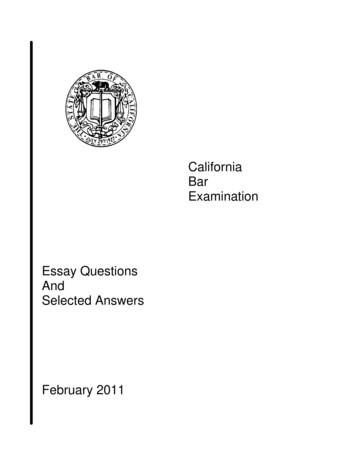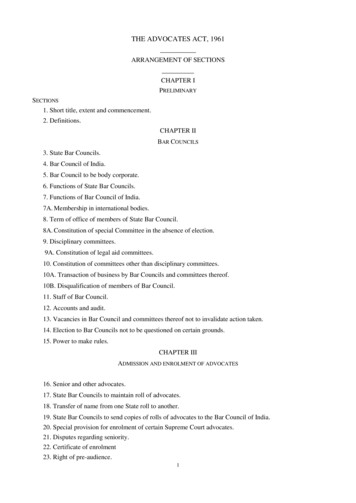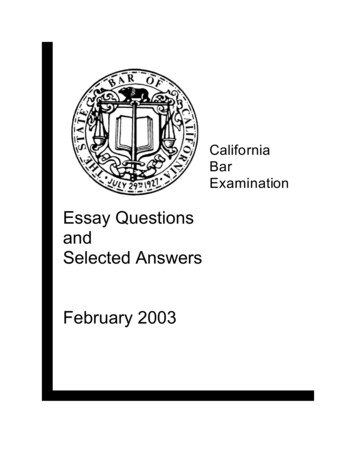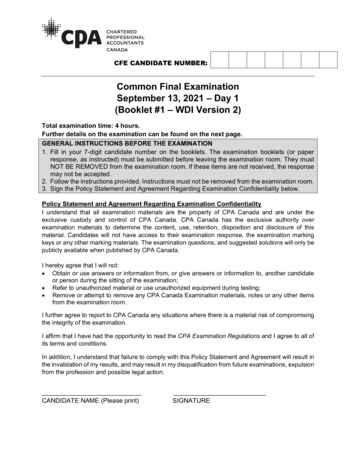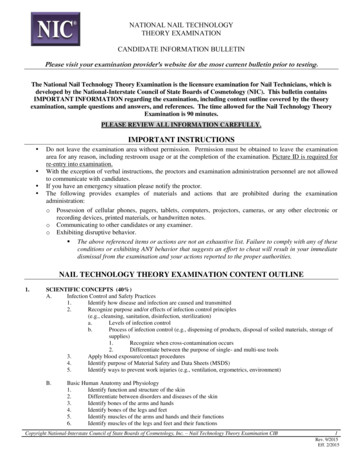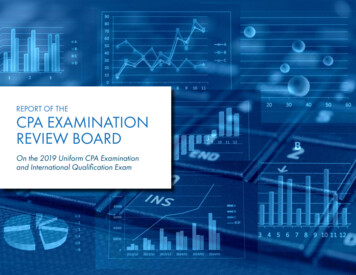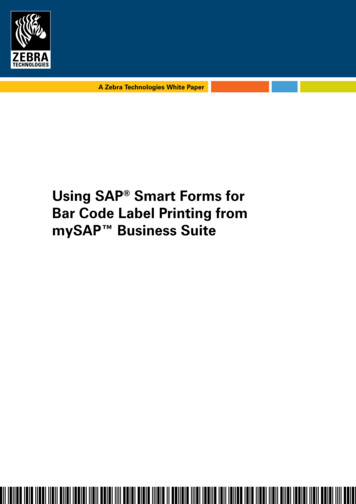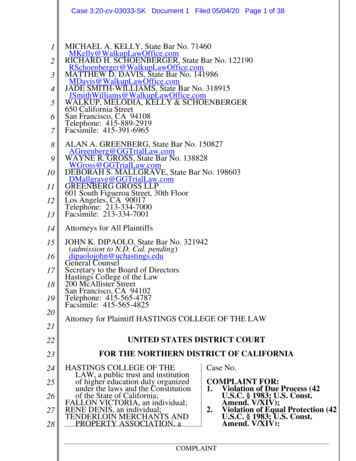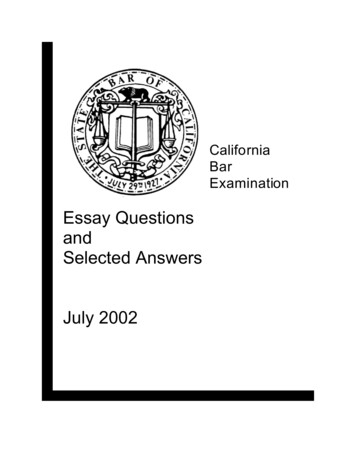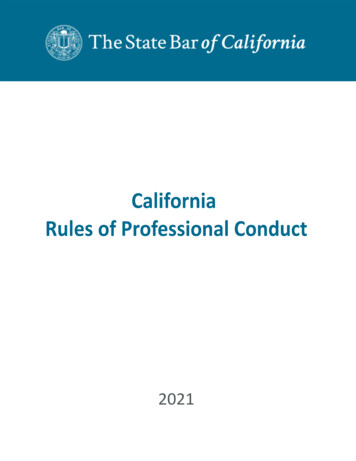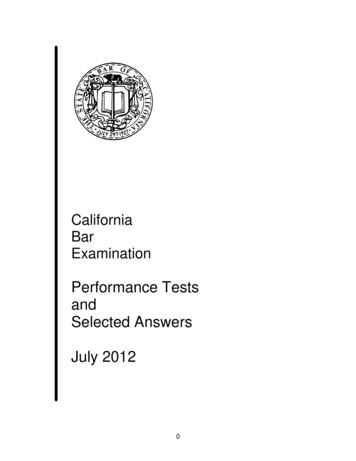
Transcription
CaliforniaBarExaminationPerformance TestsandSelected AnswersJuly 20120
PERFORMANCE TESTS AND SELECTED ANSWERSJULY 2012CALIFORNIA BAR EXAMINATIONThis publication contains two performance tests from the July 2012 California BarExamination and two selected answers to each test.The answers received good grades and were written by applicants who passed theexamination. The answers were produced as submitted, except that minor correctionsin spelling and punctuation were made for ease in reading. The answers arereproduced here with the consent of their authors.ContentsI.Performance Test AII.Selected AnswersIII.Performance Test BIV.Selected Answers1
Performance Test AINSTRUCTIONS AND FILE2
IN RE CLEF, INC.Instructions . 3FILEMemorandum from Luan Wan to Applicant . . . . . . . . 4Excerpt of CLEF’s History from Web Site . . . . . . . . . 5Interview: David Conway, CEO, CLEF, Inc . . 6Memorandum from David Conway to Luan Wan .11Attachment A: Excerpts from CLEF Board Minutes .13Attachment B: Excerpt from CLEF Internal Report . .153
IN RE CLEF, INC.INSTRUCTIONS1.You will have three hours to complete this session of the examination. This performancetest is designed to evaluate your ability to handle a select number of legal authorities inthe context of a factual problem involving a client.2.The problem is set in the fictional State of Columbia, one of the United States.3.You will have two sets of materials with which to work: a File and a Library.4.The File contains factual materials about your case.The first document is amemorandum containing the instructions for the tasks you are to complete.5.The Library contains the legal authorities needed to complete the tasks.The casereports may be real, modified, or written solely for the purpose of this performance test. Ifthe cases appear familiar to you, do not assume that they are precisely the same as youhave read before. Read each thoroughly, as if it were new to you. You should assumethat cases were decided in the jurisdictions and on the dates shown. In citing cases fromthe Library, you may use abbreviations and omit page citations.6.You should concentrate on the materials provided, but you should also bring to bear onthe problem your general knowledge of the law. What you have learned in law schooland elsewhere provides the general background for analyzing the problem; the File andLibrary provide the specific materials with which you must work.7.Although there are no restrictions on how you apportion your time, you should probablyallocate at least 90 minutes to reading and organizing before you begin preparing yourresponse.8.Your response will be graded on its compliance with instructions and on itscontent, thoroughness, and organization.1
CRESPI, DONOHO and WAN, PA9800 Commercial BoulevardSuite 1000Cooper City, Columbia 55155CDWLaw@homepage.comTO:ApplicantFROM:Luan WanRE:CLEF, Inc. – Corporate Governance ReviewDavid Conway, a law school classmate, recently became the Chief Executive Officer (CEO) ofthe College Loan Equity Fund, Inc. (CLEF), a nonprofit corporation organized under theColumbia Nonprofit Corporation Act. As his first task, Conway is reviewing CLEF’s corporategovernance practices. He had become concerned about CLEF’s practices in the course ofinterviewing for his new position. His concern has been heightened by a recent ColumbiaSupreme Court decision dissolving a high-profile nonprofit and by an even more recentannouncement by the Columbia Attorney General of an intent to propose legislation to applyprinciples from the federal Sarbanes-Oxley Act to Columbia nonprofits. On behalf of CLEF,Conway has engaged our firm to conduct an analysis of certain aspects of the company’scorporate governance procedures in light of the Smith case and the Attorney General’sproposed legislation and, if warranted, suggest modifications to current practices.Please prepare a memo that presents an objective analysis of whether the following actionsviolate Columbia law or the Attorney General’s proposed requirements:1. Engagement of an outside accountant;2. Execution of a lease of corporate facilities;3. Purchase of corporate insurance;4. Guaranty of the mortgage of the former CEO; and5. Failure to share an internal report with the Board of Directors and with loan fund6. investors.2
Excerpt from CLEF’s Web Sitehttp://www.CLEF.org/home/historyWhat is College Loan Equity Fund?College Loan Equity Fund, better known as CLEF, is a nonprofit student loan program. Themission of other lenders is to generate equity for their shareholders; ours is to provide educationfinancing to the broadest range of eligible undergraduate students. Our sole charge is to ensurethat students have access to affordable funding for their education. We focus on the HumanistGroup of colleges that constitute our membership and hundreds of non-member undergraduateschools.Our HistoryCLEF, Inc. was formed by Melvin Metzger in 1997 and funded by a 10 million gift from theMetzger Family Foundation.CLEF’s initial goal was to make low interest loans to needyundergraduate students who attended one of the 33 small, liberal arts colleges that make up theHumanist Group. These member colleges agreed to extend tuition and attendance discountsfor students who qualified for CLEF loans.CLEF is now a 5 billion nonprofit corporation with virtually all of its assets in the form ofpromissory notes on the loans it has made to thousands of undergraduate students. Although ithas become the largest not-for-profit in the student loan field, CLEF’s goal is still the same: toprovide greater access to affordable undergraduate financing, and greater access to theinformation that can help students borrow wisely, manage debt responsibly, and repay theirstudent loans successfully. And CLEF continues to make those below-market-rate loans toespecially needy students who attend a Humanist Group college.3
INTERVIEW: DAVID CONWAY, CEO, CLEF, INC.LUAN WAN: David! It’s great to see you. What’s it been, eight years or so?DAVID CONWAY: About that, Luan. It was our fifth law school reunion. I missed thetenth.WAN: It’s great to have you back in the area. Tell me about your new position withCLEF.CONWAY:Well, it’s a real opportunity.As you know, I took over as CEO afterspending nine years with United American National Bank, initially as Associate GeneralCounsel for its student loan division and then as VP of the division’s operations. UnitedAmerican is one of the top lenders to undergraduate students, right behind Sallie Maeand CitiBank.CLEF, on the other hand, is the fastest growing lender in theundergraduate market and number one among the nonprofits in the field. Even so, witha shade over 100 employees, we’re a small operation in comparison to the majorplayers in the student loan industry.WAN: What can we do to be of assistance? By the way, do you mind if we tape thissession?CONWAY: Of course not; go right ahead. As the new CEO I’m feeling my way around,poking into things to learn more about the company. When the Columbia SupremeCourt came down with the Smith decision last month it caused me to review theoperation of our Board of Directors.Then last week the Attorney General (AG)announced that he intended to propose legislation that will apply key principles of thefederal Sarbanes-Oxley Act to Columbia nonprofits.I’m now worried that some ofCLEF’s long-time Board practices are out of sync with present Columbia law and thenew regulations will be even tighter if, as is expected, the legislature adopts the AG’sproposal.WAN: Our firm does a lot of work for Columbia corporations so we have a good handleon local law. We don’t do much with nonprofits but I know the Columbia NonprofitCorporation Code tracks the State’s for-profit corporate principles.CONWAY: That’s what I thought. It also makes sense for us to anticipate how currentBoard procedures fit with the Attorney General’s efforts to extend key rules from the4
federal Sarbanes-Oxley law to Columbia nonprofits. As I see it, up-front planning iscritical.WAN: I thought that Sarbanes-Oxley only applies to for-profit public corporations?CONWAY:You’re correct; most SOX provisions are limited to for-profits.But thechatter among corporate counsel and the nonprofit community is about extending SOX‘best practices’ to the nonprofit world.WAN: SOX and ‘best practices’?CONWAY: Oh, sorry. SOX is short for Sarbanes-Oxley and ‘best practices’ means thatthe new federal governance and auditing rules have established a standard that manybelieve nonprofits should or will be forced to adopt. That appears to be the motivationof the Columbia AG — to prevent the possibility of an Enron-type scandal in thenonprofit sector by applying selected SOX principles.WAN: OK, let’s focus on your concerns about CLEF’s existing Board practices. I readbackground info on the company’s homepage so I know a bit more about CLEF and itsoperations. Pretty impressive — a 5 billion nonprofit company.CONWAY: Yeah, it is amazing that CLEF began as a ‘Mom and Pop’ lender and hasgrown up to be a player in the tough student loan business. However, certain holdovergovernance practices from its small time roots are worrying me. For example, it’s astrange Board of Directors. Of the 15 directors, five of them are effectively permanent.Although the company founder, Melvin Metzger, and four of his close personal andbusiness friends technically serve three-year terms, they’ve been on the Board sincethe company was created about 15 years ago. With unlimited terms, they keep gettingreelected by the corporation’s members, the presidents of the Humanist colleges. Fivedirectors come from the college financial aid community and the final five are collegepresidents, at least three of whom must be from the Humanist Group of colleges. Thefinancial aid directors and the presidents serve single staggered terms of three years.WAN: What’s the problem?CONWAY: Two things. First, there’s a high turnover among the members who comefrom the academic community. The financial aspects of the student loan business arevery complicated. There’s a steep learning curve so by the time the financial aid typesand the college presidents have caught on, they’re rotating off the Board. This means5
they often defer to the five ‘permanent’ Board directors on key questions. Second, theBoard composition means we don’t have any truly sophisticated financial types, no onefrom investment banking or the consumer credit field. These are serious handicaps intoday’s complex and competitive student loan business.WAN: Hmmm. I can see the problem.CONWAY: I’m very concerned this will only get worse unless we do something. Eventhe most naive new director asks how much Directors and Officers Insurance weprovide in case the directors get sued. But in a post-Enron environment, new directorswith investment banking or other sophisticated experience in consumer finance certainlywill insist on broader and more expensive coverage.WAN: I see.CONWAY: Deferral to the permanent directors and the lack of financial sophisticationhas led to what I believe are some questionable governance traditions at the Boardlevel. For example, CLEF has used a local CPA firm, Metzger Associates, to conduct itsfinancial oversight since the early days of the company.WAN: Metzger Associates? Any relationship to ?CONWAY: Yup, Sue Metzger, the principal in Metzger Associates, is Melvin’s firstcousin. However, if we bring in a national accounting firm and conduct rigorous, indepth SOX-type audits, it will cost the company twice what we pay Metzger.WAN: Uh oh, that could create cost-control questions. Anything else?CONWAY: Two years ago when CLEF added a loan servicing division the number ofemployees doubled, from about 50 to over 100. The company was forced to find largerquarters and it signed a long-term lease for a vacant department store that wasremodeled to accommodate the expanded operations. Bernie Baugh, a member of theCLEF Board and Melvin Metzger’s college classmate, is a partner in Center City Realty,the company that owns the property and served as the general contractor for therenovation of the facilities.WAN: Wasn’t that an issue in the Smith decision, questions about ‘insider’transactions?CONWAY: That’s one of the reasons I became nervous. In digging around, I alsocame across a recent internal report authored by the director of strategic planning that6
forecasts changes in the student loan market that could affect the company’s liquidity.The report never was sent to the Board by my predecessor and it wasn’t disclosed topotential investors in the last investment offering.WAN: Can you provide me documentation of these incidents you just described?CONWAY: I’ll fax over a memo I’ve been working on that outlines what I’ve found sofar. I’m still feeling my way and there may be more. I’d appreciate your analysis abouthow these actions jibe with Columbia law.WAN: We’ll get something back to you as quickly as possible.CONWAY:Thanks. I also need your assistance in anticipating the impact of theAttorney General’s sketchy proposal to apply some SOX-like rules on Columbianonprofits. With 5 billion in assets and 150 million in annual revenue, CLEF is exactlythe type of nonprofit that is the target of his legislation. Given the somewhat loosegovernance practices followed in the past, there’s no question in my mind that CLEFneeds to be alert to the likely stricter financial accountability standards the AG isproposing.WAN: That seems to make sense, but why do you need us? You’re an excellent lawyerand have years of experience in the for-profit student loan field with an organization thatis subject to Sarbanes-Oxley. Why don’t you review the AG’s proposal and make yourrecommendations directly to the Board?CONWAY: First, I’m the CEO and I shouldn’t act as the company’s legal advisor. And,frankly, the situation is fairly delicate. The company has been run like a familyfoundation pursuing its philanthropic mission. Melvin Metzger, the founder and Boardchairman since the company’s inception, is passionate about providing financial supportto young people seeking an education. He had the financial resources to begin thenonprofit company and the business acumen to alter its operations several times tokeep CLEF afloat and greatly expand its reach beyond the original group of students.Unfortunately, Melvin has a very proprietary attitude toward the Company and doesn’trecognize that Board practices do not seem to have kept pace with CLEF’s rapidtransformation from a private foundation to a minor marketing company to a full-fledgedfinancial institution that attracts major international investors and manages a significantloan portfolio. I am committed to making CLEF the model student loan company – profit7
or nonprofit – by adhering to the highest standards of Board governance and financialoperations.But I have to be careful in communicating any criticism about currentpractices. Sound advice from a qualified objective source, such as your firm, will bebetter received by Melvin and the Board.WAN: While I understand you’re new and Metzger apparently is set in his ways, isn’t itclear to everyone that avoiding potential liability is in the interest of the company and theBoard? Assuming good faith on the part of the directors, how can they object to yourcall for high standards?CONWAY: Well, the problem in transitioning the company to its new financial andbusiness reality is cultural as much as anything.I’m worried about straining long-standing positive personal relationships among Board members.WAN: OK, let me take a look at the Columbia Nonprofit Corporation Code, the casehanded down by the Supreme Court and the Attorney General’s announcement abouthis intended legislative proposal before making any recommendations for you to take tothe CLEF Board. You send me the memo you mentioned and we’ll do our very best.CONWAY: Thanks, Luan.8
College Loan Equity Fund, Inc.Affordable Funding for Undergraduate EducationBox 2004 Cooper City, Columbia 55354MEMO --July 18, 2012TO:Luan Wan, Crespi, Donoho & Wan, P.A.FROM:David Conway, CEORE:CLEF Corporate GovernanceAs a follow-up to our conversation, the following is information I have gleaned fromvarious CLEF sources. I have attached what I believe to be relevant excerpts fromCLEF Board Minutes over the last six years (Attachment A) and the Executive Summaryfrom an internal CLEF report prepared by our Director of Strategic Planning dated sixmonths ago and prior to CLEF’s most recent investment offering (Attachment B).Audit and Financial Issues:CLEF receives an annual accounting report from Metzger Associates but it doesn’tconform to Generally Accepted Accounting Principles (GAAP standards) used bynational accounting firms when performing traditional audits of many financialinstitutions.Although the accounting approach used by Metzger is common whenreviewing small and medium size businesses, it does not go into the depth of analysissophisticated financial institutions usually demand and expect, especially those whoregularly seek significant funding from international investors. The Board doesn’t havea separate audit committee. In fact, it functions as a committee of the whole for all of itswork.For example, an informal executive committee, now composed of MelvinMetzger, Bernie Baugh and Jane Cross but not created by formal Board action,functions on behalf of the Board in the interim between the quarterly meetings.9
As I mentioned when we met, CLEF doesn’t have a well-balanced and diverse boardwith a lot of financial savvy. I am concerned the Board doesn’t have the expertise tounderstand complex finance and macroeconomic projections, evaluate accountingrecommendations and make generally sound financial decisions to fulfill its fiduciaryresponsibilities. CLEF’s chief financial officer (CFO) leads a generally passive Boardthrough all reviews of Metzger’s accounting advice and the complex financialdocuments the Board has to approve for the annual investor offering process. TheCLEF CFO and CEO are always present when Metzger presents any type of report tothe Board.Certification:The only annual report of a financial nature generated by CLEF is IRS Form 990.Nonprofits under 501(c)(3) do not pay taxes but they must report revenue andexpenditures (and any fundraising activity). CLEF’s CEO signs off on this report but itdoesn’t come to the Board for review. My predecessor, Curtis Johnson, the former VPfor Financial Aid at Bond College, knew financial aid and student loans but he didn’thave an accounting or finance background.Conflicts of Interest:CLEF needs to adopt a conflict of interest policy with disclosure standards to guide theboard and staff in independent decision-making. Given several of the transactions ofthe CLEF Board memorialized in the attached Minutes, this is an area about which Ihave great concern and seek your advice and guidance.10
Attachment AExcerpts from CLEF Board MinutesOctober 5, 2011:Mr. Morgan moved and Ms. Gilmore seconded the reappointment of MetzgerAssociates as CLEF’s certified public accountants. Mr. Morgan noted that this would bethe 13th year CLEF has used Metzger Associates as its accounting firm. He mentionedthat literally and figuratively Sue Metzger, the cousin of Board Chair Metzger, is a longstanding member of “the CLEF family” and she understands the Company’s culture andgoals. The motion was adopted unanimously without discussion.April 14, 2009:The Board discussed the need to build or lease new facilities to accommodate theexpected growth in employees due to the impending creation of a loan servicingdivision. The CEO and the Board Chairman reported their judgment that the vacantPomeroy’s Department Store in West Cooper City was ideal. With 80,000 square feetand a large parking lot, the property will meet short and long-term projected needs forspace. CLEF has been offered 10 per square foot in annual rent for a ten-year termwith an option to purchase the property or renew the lease for an additional five years.Renovation estimates run between 800,000 and 1 million, including all furniture. Ms.Metzger from Metzger Associates reported that these figures were within the facilitiesbudget earlier adopted by the Board. On the motion of Ms. Cross, seconded by Mr.Baugh, the Board unanimously (1) approved the lease with Center City Realty; and (2)approved engaging Center City Realty’s construction division to serve as the generalcontractor for the necessary renovations.October 19, 2007:The Board took up the matter of the appointment of Curtis Johnson, the VP for FinancialAid at Bond College, as CLEF’s CEO for a term of five years. Board Chairman Metzgerreported that negotiations were almost complete. One issue remaining was Johnson’sneed for a mortgage in the amount of 420,000 to purchase a house in Cooper City.Board member Anthony Niedwicki, Executive Vice President of Cooper City Savings,indicated that his bank would make the loan if CLEF would sign as a guarantor. On themotion of Ms. Gilmore, seconded by Mr. Morgan, the Board agreed to guaranty Mr.Johnson’s mortgage.June 15, 2006:The Board discussed the rising costs associated with various insurance policiesrequired to operate the business. Mr. Metzger reported it would cost almost 95,000 torenew the insurance package with Intercontinental Insurers for the next fiscal year.11
Board member John Morgan, a principal in the Cooper City Insurance Consortium,stated he could provide the company with identical coverage at a price at least 10percent below that quoted for renewal. The Board adopted Ms. Maurer’s motion topurchase the necessary insurance from the Cooper City Insurance Consortium.12
Attachment BExcerpt from CLEF Internal Report:January 21, 2012TO:Senior ManagementFROM:Wendy Sims, Director of Strategic PlanningSUBJECT: Challenges to CLEF’s Cash FlowExecutive Summary: Combining the Chief Financial Officer’s most recent Companyprojections and my analysis of the U.S. business climate and college enrollment, Iperceive two obstacles to CLEF’s short and long-term revenue estimates. First,continued weakness in the white-collar job market nationwide means that fewer collegegraduates are being employed in high salaried positions. Accepting lower paying jobsmeans that some graduates will earn less and will have greater difficulty in servicingtheir loans. Based on CLEF’s accumulated data, I estimate that our student loandefaults will slowly rise from six to thirteen percent of the annual loan volume.Complicating the consideration of cash flow is the sharp rise in college graduatesentering professional and graduate schools. Medicine, dentistry, law and business areexperiencing record applications. A significant shift by college graduates away from thework force and into postgraduate study will mean that undergraduate loans will bedeferred for the duration of graduate work. This is likely to result in a dip in CLEF’sexpected revenue for up to four years. Such a change in revenue may negatively affectour ability to attract investors in our next offering.13
Performance Test ALIBRARY14
IN RE CLEF, INC.LIBRARYSelected Provisions of Columbia Nonprofit Corporation Code . . 16Smith v. Columbia Children & Family Services, Inc.Columbia Supreme Court (2012) . . 5Office of the Attorney General: News Release . 1415
Selected Provisions of Columbia Nonprofit Corporation Code§ 4830. Performance of Duties by Director of a Nonprofit Corporation; Liability(1) A director shall perform the duties of a director in good faith, in a manner suchdirector believes to be in the best interests of the nonprofit corporation and its membersand with such care, including reasonable inquiry, as an ordinarily prudent person in alike position would use under similar circumstances.(2) So long as a director acts in good faith, after reasonable inquiry when the need isindicated by the circumstances and without knowledge that would cause such relianceto be unwarranted, a director shall be entitled to rely on information, opinions, reports orstatements, including financial statements and other financial data, prepared orpresented by any of the following:(a) Officers or employees of the corporation the director believes to be reliableand competent in the matters presented;(b) Counsel, independent accountants or other persons as to matters the directorbelieves to be within such person's professional or expert competence; or(c) A committee of the board upon which the director does not serve, as tomatters within its designated authority, which committee the director believes to meritconfidence.(3) A person who performs the duties of a director in accordance with subdivisions (1)and (2) shall have no liability based upon any alleged failure to discharge the person'sobligations as a director.§ 4832. Conflict of Interest Transactions(1) A conflict of interest transaction is a transaction with the corporation in which adirector or officer of the corporation has a direct or indirect interest.(2) A director or officer has a conflict of interest if, but not only if, another entity in whichthe director or officer has a material interest is a party to the transaction or anotherentity of which the director or officer is a director, officer, or trustee is a party to thetransaction.(3) Any conflict of interest transaction is voidable by the corporation, and may be thebasis for liability of a director or officer, unless the transaction was fair at the time it wasentered into or is approved in accordance with subdivision (4).(4) A conflict of interest transaction may be approved if:16
(a) The material facts of the transaction and the director's or officer's interestwere disclosed or known to the board of directors or a committee consisting entirely ofmembers of the board of directors and the board of directors or such committeeauthorized, approved, or ratified the transaction;(b) The material facts of the transaction and the director's or officer's interestwere disclosed or known to the members and they authorized, approved, or ratified thetransaction; or(c) Approval is obtained from:(i) The attorney general; or(ii) A court of record having equity jurisdiction in an action in whichthe attorney general is joined as a party.(d) Approval by the board requires the affirmative vote of a majority of thedirectors who have no direct or indirect interest in the transaction, but no suchtransaction may be approved by a single member of the board.(e) Approval meeting the requirements of subdivisions (c) and (d) removes thevoidability of the transaction by the corporation and personal liability for directors andofficers, but directors so approving must comply with their fiduciary duties in decidingwhether to approve.(f) A director who votes for, assents to or ratifies a transaction made in violationof the Nonprofit Corporation Code and does not comply with standards of conductestablished in § 4830 is personally liable to the corporation.17
SMITH v. COLUMBIA CHILDREN & FAMILY SERVICES, INC.Columbia Supreme Court (2012)The Attorney General filed suit pursuant to Columbia Nonprofit Corporation Code(“Code”) to dissolve a nonprofit corporation, Columbia Children and Family Services,Inc. (CCFS). The trial court granted summary judgment for the Attorney General, findingthat CCFS had abandoned its charitable purpose and devoted itself to private purposes,and ordered the appointment of a receiver to preserve the remaining corporate assets.CCFS appealed.The Attorney General maintained that CCFS, a nonprofit, tax-exempt corporation,repeatedly violated the Columbia Nonprofit Corporation Code by: (1) renting propertyowned by Emily Madison, the sometimes executive director and chairperson of theCCFS board of directors; (2) investing CCFS funds in a local bank in which boardmembers had an interest; and (3) approving transactions that inured to the benefit of theboard chairperson and her family and friends.CCFS’s charter of incorporation lists as its purpose: “to provide comprehensive socialservice for young people who are teenage mothers, handicapped children,underachievers in school and special-problem children.” As a nonprofit corporation,CCFS is authorized “to seek public and private funds” to achieve its goals. As it turnsout, the Columbia Department of Human Services (DHS) provided almost all of CCFS’sfunds.1In general terms, a nonprofit is an organization in which no part of the income isdistributable to its members, directors or officers. A nonprofit corporation is notprohibited from conducting enterprises for income or from accumulating earnings.However, such revenues must be used for the purposes set forth in the charter. Nopecuniary gain can inure to directors or officers and there can be no direct or indirect1According to the trial court’s finding, more than ninety-nine percent of CCFS’s revenuecame from DHS. In the three years preceding the Attorney General’s action, DHSprovided the company with 3.1 million in 2007; 6.8 million in 2008; and 4.9 million in2009.18
distribution of income or profits to them. For example, under § 4858 of the Code,nonprofits are specifically prohibited from lending money to, or guaranteeing theobligation of, a director or officer of the corporation. The bargain made with thegovernment, the taxpayers, and the public in return for benefits such as tax exemptionis that the nonprofit will operate for the public good and not for the enrichment of thoserunning it.Directors and officers of nonprofits, like their for-profit counterparts, owe two basicfiduciary duties to the corporation: the duty of care and the duty of loyalty.The duty of care imposed on corporate nonprofit directors by the Code constitutes amandate that directors must in appropriate circumstances
Examination and two selected answers to each test. The answers received good grades and were written by applicants who passed the examination. The answers were produced as submitted, except that minor corrections in spelling and punctuation were made for ease in reading. The answers are reproduced here with the consent of their authors.

